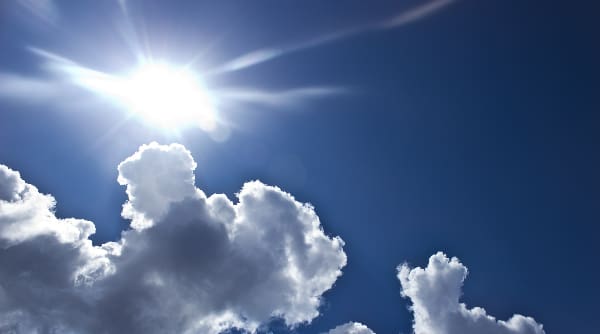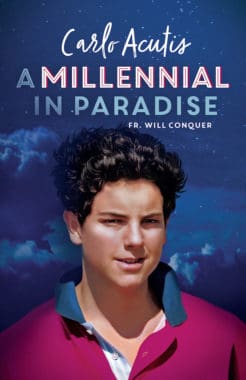Carlo, Our Little Hero
In each generation, heroes of the faith, whom the Church recognizes as saints, emerge. They have understood that holiness is not about imagining past holiness or dreaming about a better world; rather, it is living their present lives as disciples of Christ. Therefore, holiness takes place in the here and now. Everybody is called to embrace his own unique call to holiness that God gives him. Of course, we are not saying that it is easy. On the contrary, we are saying that it is heroic. However, this holiness is not inaccessible. These heroes are not always those we think about. In reality, they are not all that different from us. This book will actually make us discover a hero who resembles us.
Carlo Acutis could be the first millennial to become a saint. Thus, he would be the first twenty-first century adolescent to be offered to us as a model by the Church, the first young person of the third millennium to be cited by a pope, and the first saint to be recognized by the Church in a context that it is common to us. He grew up in the Europe that we know—a peaceful Europe that we can freely travel in. He would be the first saint to enter Heaven with a cellphone in his hand, to have used a computer, sent emails, done research on Google, and found answers to his questions there. From the time he was a child until he was fifteen years old, he was confronted by the same problems we have personally encountered. Through the research that I have done to write this spiritual biography, I have really been touched by him. Carlo is one of my direct contemporaries. We have experienced the same historical events and shared a number of common challenges in our relationship with God and others. His life has opened my eyes to many chapters of my adolescence that I would prefer to leave in the unexamined drawers of my past. He has reconciled me with it. By immersing yourself, in turn, in his life, you will notice how much he looks like us more and more.
Of course, there is perhaps something that differentiates us. He could already be in Heaven. We are still here on earth. But do we have to be dead in order to be holy? This is the first question we can ask ourselves when we see the faces of our immortalized saints, whether it be through white marble sculptures, Renaissance paintings, or black-and-white photos for the most contemporary ones. We see that Carlo was really alive and very colorful. He smiled at life and played different sports, ranging from soccer to skiing. He loved computer science. He ran every- where, traveled to the four corners of Europe, and, in every situation, maintained a good sense of humor and was quick-witted. Even in Heaven, Carlo continues to be very much alive—indeed, even more than ever! Like St. Thérèse of Lisieux, he can repeat: “I will spend my heaven doing good on earth.” Today, his reputation has spread to five continents. Facebook pages from Australia to Korea are dedicated to him. His life is already inspiring the themes of musicals in France. The official site that is devoted to him is now available in six languages, including Chinese! This devotion extends to Brazil. Many people suffering from serious illnesses have asked God to have the faith that Carlo had in facing his illness—the deadly leukemia that struck him. Many have even been healed and attribute their healing directly to Carlo’s specific intercession for them! Finally, websites that Carlo developed to evangelize are still functioning, and are seen and accessed by many users. The exhibitions on Eucharistic miracles he created continue to go around in many churches.
On their own, the dead cannot do anything good for those of us on earth. But if Carlo continues to do so much good—and touch so many hearts who, by his witness, return to God and the Church—he is truly alive and close to God.
Holiness as a Life Program
Nonetheless, we do not become heroes simply by changing costume like cinematic superheroes do. Heroism is not learned in one night. We have to live in order to acquire all the virtues we need in today’s world. Carlo made use of his whole life to live out these virtues. Creating a masterpiece takes time—sometimes several years. The same thing applies to a masterpiece of holiness. But be warned! Holiness is not the absence of sin. If that were the case, it would be better for us not to have been born, for each day that goes by would be a dreaded opportunity to fall. Holiness is not a black-and-white, spotless painting like Kazimir Malevich’s black square, but a life that is totally filled with God’s grace. It is a painting with a thousand colors, like the angel wings on Fra Angelico’s frescoes. To become a saint at the age of fifteen is to succeed in what most of us have not yet managed to do when we are twenty, thirty, or even ninety-nine. Our own life, if we look at it with a certain amount of honesty and humility, should remind us that what Carlo experienced is not all that ordinary. With all the trials of life, the simple fact of remaining faithful and joyful in adolescence is a challenge for most of us.
But to recognize Carlo’s holiness is also to accept, along with him, the challenge that the holiness he took up in our world is indeed attainable. Carlo was not more predisposed to be holy than we are. All of us have been called to be holy since the day of our Baptism. Holiness is not just good behavior and good manners that our parents could teach us. It is an authentic and personal encounter that Carlo’s life will show us. His life exuded authenticity. It was not a life that was invented or embellished like a blissful legend. The testimonies of holiness that are as fresh as Carlo’s are rare. Even rarer are the saints about whom we can still question so many living witnesses. You just have to walk around the streets of Assisi with Carlo’s mother to be aware of it today. Everyone wants to talk to tell her about a memory shared with her son.
All these testimonies have been gathered, piece by piece, into an immense file, the positio, which has been compiled by Nicola Gori, the postulator, the one whose mission is to make Carlo known to the Church and the world. The life of Carlo that you will read about here is, therefore, neither a historical novel nor an imaginary tale. It is neither Harry Potter nor The Little Prince. But it is perhaps better. It is a young person, like you and me, who wants to share with us the joy of already being in Heaven.
+
This article is adapted from a chapter in A Millennial in Paradise by Will Conquer, which is available from Sophia Institute Press.
Art for this post: Cover and featured image used with permission.





